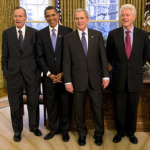Bari Weiss, a New York Times opinion writer, quit her job following relentless defamatory, bigoted, anti-Semitic, workplace bullying from her super-woke colleagues. And workplace bullying is a lot more common than one might think.
sociology
Infectious disease models can also describe riots. The spread of coronavirus and violent protests share many features in common, shedding at least some light on the coming summer of discontent.
Americans have developed a social pathology in which we pin our collective hope and hatred on a single person, the President of the United States. This began long before Donald Trump took office, but the coronavirus pandemic has greatly worsened the problem.
NYU physicist Alan Sokal thought very little of the research performed by his colleagues in the social sciences. To prove his point, he wrote a paper that used plenty of trendy buzz words but made absolutely no sense. As he later explained, Dr. Sokal wanted to find out if a humanities journal would "publish an article liberally salted with nonsense if (a) it sounded good and (b) it flattered the editors' ideological preconceptions."
It would. His paper, "Transgressing the Boundaries: Toward a Transformative Hermeneutics of Quantum Gravity," was published in the journal Social Text in 1996, and his hoax has earned him a place in scientific history.



